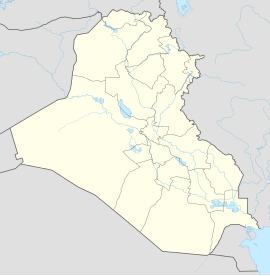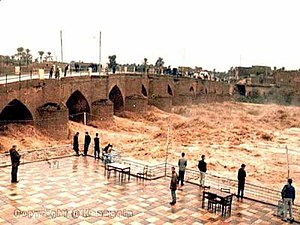Chanaqin
| Chanaqin | ||
|---|---|---|
| location | ||
|
|
||
| Coordinates | 34 ° 21 ′ N , 45 ° 23 ′ E | |
| Country |
|
|
| Governorate | Diyala | |
| District | Chanaqin | |
| Basic data | ||
| height | 180 m | |
| Residents | 175,000 | |
| The Alwand River in Chanaqin | ||
Chanaqin ( Arabic خانقين, DMG Ḫānaqīn , Kurdish خانه قين Xaneqîn ) is a city in Diyala Governoratein northeastern Iraq near the Iranian border. The population is estimated to be 175,000, but due to Iraqi politics under Saddam Hussein there were no reliable figures. Kurds see the city as Kurdish.
Chanaqin is traversed by the Alwand River, which has played an important role in the cultivation of the land and the development of a strongly peasant society. The river has its source in the Iranian Zāgros Mountains and flows through Chanaqin to later flow into the Diyala . According to a 2012 report from the UK's International Center of Development Studies , the Iranian government drained the river without consulting its neighbor, causing dramatic falls in agriculture.
Name and story
Chanaqin's original name was Du-Chānag (دوخانگ), which was Persian and meant The Two Houses . After the Arabs conquered these areas, many names were Arabicized. So the word Du ( Eng . : two) was replaced by the Arabic dual -ayn. This made Du-Chānag Chānag-ayn and finally Chanaqin.
During the Muslim conquest, there was a battle in the area around Chanaqin. It is mentioned in Ibn al-Faqih. Under Arab rule, Chanaqin was an insignificant city and a stop on the way from Baghdad via Hamadan to Khorasan. Viticulture is also described. From the 16th century until the end of the First World War, the city belonged to the Ottoman Empire. In 1916, an Ottoman-Russian battle took place here during the war, which the Ottomans won. Nevertheless, the Ottomans had to evacuate Iraq because of the defeat and lost the territories to the British.
population
In the region around Chanaqin Kurds make up the majority of the population, they mainly speak the Kurdish dialects Kelhuri and Gorani . During the systematic Arabization policy of the Iraqi regime, Arabs were settled in the city, the Kurds and other minorities were resettled to the south of Iraq or fled to the Kurdish-controlled north. After the fall of Saddam Hussein in 2003, residents wanted the city to officially join the Kurdistan Autonomous Region . This should be determined with a referendum. Chanaqin is populated by many Kurdish tribes such as the Arkewazi, Talabani, Jaff, Dalewi, Bajalan, Abdulrahman, Gimur and Suremeri. A small, long-established Jewish community left the city and country in the early 1950s.
oil
After Kirkuk , Chanaqin is the second largest city with an oil industry in northern Iraq, there is an oil refinery and a pipeline to Baghdad .
The Naft Khana oil field delivers up to 16,000 barrels of oil per day. The oil field extends into Iran and is therefore also used by Iran. In March 2006, the oil production system was repaired, so that the level before the Iraq war was reached again. The oil is currently being trucked to the Al Daura refinery.
A refinery is planned to be built in Chanaqin which will process 20,000 barrels of oil per day on site.


